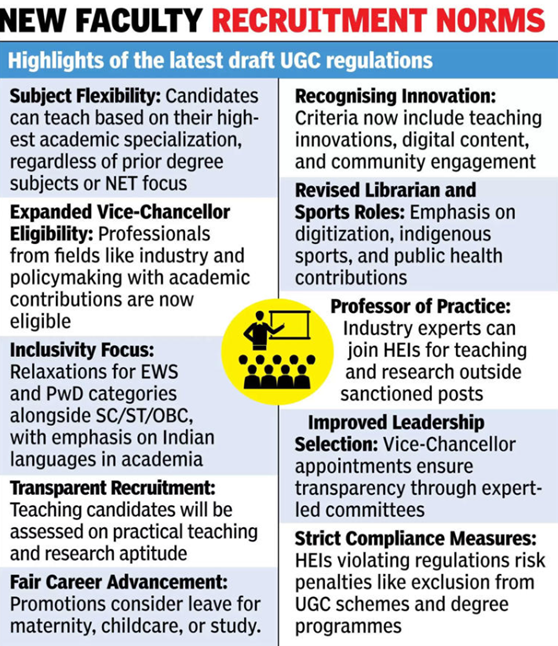By Dr. Gyan Pathak
Draft UGC Regulation 2025 seems to be caught into a rough weather. Six-opposition ruled states – Himachal Pradesh, Jharkhand, Kerala, Tamil Nadu, Telangana and Karnataka – have passed a joint resolution against it. Another opposition ruled state Jammu and Kashmir is also not happy with the draft, and West Bengal has already voiced its concern and had constituted an expert committee for studying the draft regulation for its final stand. The states ruled by NDA like Maharashtra, Bihar, and Andhra Pradesh have also certain objections, which the BJP allies have already conveyed. It is in this backdrop, the UGC was obliged to extend the last date of submission of responses on Draft UGC Regulation 2025 from February 5, 2025 to February 28, 2025.
On February 6, 2025, a conclave of Ministers of Higher Education and their representatives was organized by in which participating six states passed a joint resolution against the Draft UGC (Minimum Qualifications for Appointment and Promotion of Teachers and Academic Staff in Universities and Colleges and Measures for the Maintenance of Standards in Higher Education) Regulations, 2025, and grading of higher education institutions based on the New Education Policy-2020. A day after, the University Grant Commission has extended the last date of submission of response for stakeholders.
It should also be noted that Maharashtra was also to join the conclave virtually but unable to continue because of technical problem. It was a significant development since Maharashtra is ruled by the BJP where its allies Shiv Sena (Shinde) and NCP (Ajit Pawar) were understood to have conveyed their opposition to certain provision of the draft.
Jammu and Kashmir is ruled by the opposition National Conference and their representative was to join the conclave. However, J&K Minister of Higher Education could not participate in the opposition Conclave due to certain emergency meeting in the state. Nevertheless, the political leadership of the state is against the draft UGC Regulation 2025.
West Bengal could not participate in the opposition meeting, but the TMC led ruling establishment has already objected to the draft UGC Regulation 2025, and constituted an expert committee to study it in detail. The state would raise specific objections after the expert committee’s report.
Even more import was the objections raised by the key NDA allies like TDP, JD(U), and LJP(RV). JD(U) led by Nitish Kumar has called for the draft legislation to be amended to protect state power. The new rules give greater power to chancellor – usually Centre-appointed state governor, it said. TDP led by Chandrababu Naidu and LJP (RV) led by Chirag Paswan have also reportedly conveyed their reservations to certain provisions.
The draft UGC Regulation 2025, was not only opposed chiefly by the opposition ruled states and their leadership, but also other stakeholders, such as former academicians and even Vice Chancellors, terming the draft UGC Regulation a threat to the University Autonomy. They say, that if the new proposed regulation is implemented, education will fall into the hands of private sector players, even in the hands of industries and businesses, who have no real understanding of the field of education.
In the joint resolution, the six states have urged the Union Government to immediately withdraw the draft UGC Regulation 2025, and hold a collective consultation with states. In the 15-point resolution, it was stated that the BJP-led Union Government is trying to push its agenda and ideology through the new regulations, undermining federal principles.
It is worth recalling that Tamil Nadu and Kerala Legislative Assemblies have already passed resolutions against the drat UGC Regulation 2025.
On February 6, the Telangana Education Commission (TEC) have also passed a resolution against the draft UGC Regulation 2025 and supported the state government’s move to oppose it. “The controversial proposals in the regulations vest the authority to constitute the search-cum-selection committee for appointment of vice-chancellors for all the universities in the country to the governors of the states, who essentially represent the central government and drastically reduce the role of the state governments,” the commission said, adding, “Such a process does not allow state governments to address the local needs of higher institutions and further centralises the system, undermining diversity. This strikes the very root of the federal structure of the Indian Constitution since education is on the concurrent list.”
Responding to the resolution of the six states, UGC Chairman Prof. Mamidala Jagadesh Kumar has said that UGC would welcome constructive feedback and would work collaboratively, adding the new draft regulations “aim to ensure the highest standards in universities by introducing a more inclusive and transparent selection process” … and also “seek to uphold the autonomy and accountability of higher education institutions.”
Leader of the Opposition in the Lok Sabha, the Congress leader Rahul Gandhi has also opposed the draft UGC Regulation 2025, and criticised it as an attempt of the ruling BJP to push the RSS agenda. Samajwadi Party leader Akhilesh Yadav has said that his party fully supports the protest against the draft UGC Regulation, adding, “This New Education Policy is a conspiracy to hand over universities to industrialists. It aims to strip state governments of their powers and turn politicians into servants of industrialists. We will never support this policy. They want to seize all the powers of the state governments.”
Nevertheless, Union Minister of Education Dharmendra Pradhan has said, “It is both unfortunate and concerning to see how some political leaders, including the LoP, twist progressive educational reforms into imaginary threats to sustain their outdated political narratives.” He also said, “The UGC draft regulations aim to broaden horizons, not narrow them. They seek to include more voices, not silence them. They uphold institutional autonomy and our linguistic diversity. They strengthen our academic institutions, not weaken them. But perhaps these facts are too inconvenient for those who prefer rhetoric over reality.”
However, the UGC Secretary, Prof. Manish R Joshi, said, “Given requests from stakeholders to extend the last date to submit feedback on the draft UGC Regulations 2025, UGC has now decided to extend the last date to February 28, 2025.”
The draft UGC Regulation 2025, which was released on January 6, 2025 by Union Education Minister Dharmendra Pradhan would replace the 2018 guideline. The new draft has been updated in accordance with the provision of the National Education Policy 2020. (IPA Service)




 Under Yunus Regime In Bangladesh, Anti-Democracy, Communal Elements Thriving
Under Yunus Regime In Bangladesh, Anti-Democracy, Communal Elements Thriving 